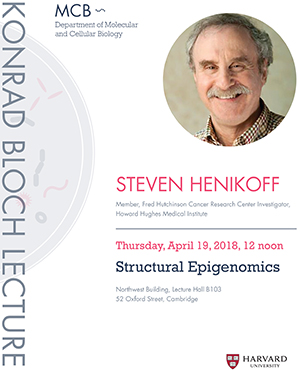This year’s Bloch Lecture will be given by Steven Henikoff, Member of the Basic Sciences Division of the Fred Hutchinson Cancer Research Center and Investigator of the Howard Hughes Medical Institute.
Henikoff earned his doctorate here from the Department of Biochemistry and Molecular Biology where he worked during 1971-1977 in the laboratory of Matthew Meselson. Henikoff’s dissertation research was on “RNA Sequences Transcribed from Heat-induced Puff Sites in Drosophila“. In some parts of his research Henikoff collaborated with fellow graduate students in the Meselson laboratory, Susan Lindquist (then McKenzie) and Janet Heywood. After leaving Harvard, Henikoff conducted postdoctoral research on position-effect variegation in Drosophila in the laboratory of Charles Laird in the Department of Zoology at the University of Washington.
Henikoff’s current research is on chromatin dynamics, transcriptional regulation, centromere inheritance and DNA torsional dynamics. He is a highly original thinker, having developed innovative experimental and computational methods for studying these and other processes.
Dr. Henikoff is a member of the National Academy of Sciences.
by Matt Meselson
About the Konrad Bloch Lecture
Konrad E. Bloch was an outstanding scientist who helped shape the discipline of biochemistry in its formative years. One of the founders of biochemical studies at Harvard, he was part of the pioneer generation that included George Wald, Paul Doty, John Edsall and Frank Westheimer. Best known for his studies of cholesterol, he was awarded the Nobel Prize in Medicine or Physiology in 1964 (shared with Feodor Lynen) for investigations in the mechanism and regulation of cholesterol and fatty acid metabolism. Especially noteworthy were the studies on the biological synthesis of the molecule and, according to the Nobel Prize website, “on various aspects of terpene and sterol biogenesis…enzymatic formation of unsaturated fatty acids and…in various aspects of biochemical evolution.”
Arriving at Harvard from the University of Chicago in 1954, he was appointed Higgins Professor of Biochemistry, a position he held until his retirement in 1982. He was part of the core group at Harvard that founded the Committee on Higher Degrees in Biochemistry. With the somewhat later arrival of James Watson, Matthew Meselson, Walter Gilbert, Mark Ptashne and Guido Guidotti, Harvard had achieved a remarkably dynamic and productive core group in biochemistry and molecular biology, of which Dr. Bloch was a signal part. The late Dean Jeremy Knowles described him as “a marvelously perceptive biochemist and a wise, generous and cultivated man who forged the connections between chemistry and biochemistry. He was one of that distinguished line of European biochemists whose deep understanding of metabolism laid the chemical foundations of today’s biology.” [quoted in Harvard Gazette, Oct. 19, 2000]
Dr. Bloch was born in Neisse, then part of Germany, in 1912; he was racially excluded from his studies at Munich in 1934 upon the Nazi advent to power. His subsequent odyssey began in Switzerland, and he was spared a likely fatal return to Germany by the intervention of John Anderson, a Yale biochemist, who helped him with a visa to the US. In America, his studies resumed at Columbia; after a brief stay in Chicago, he came to Harvard.
His work was widely recognized; in addition to the Nobel, he received the US National Medal of Science, and many other awards and honorary degrees. In addition to his scientific output, he wrote intriguing popularizing works such as “Blondes in Venetian Paintings, the Nine-banded Armadillo, and Other Essays in Biochemistry”. He died in 2000, at the age of 88. In 1986, the annual Konrad Bloch lecture was inaugurated in his honor.
The author wishes to express his gratitude to Prof. Guido Guidotti for reviewing the text for accuracy.
by Jim Henle



